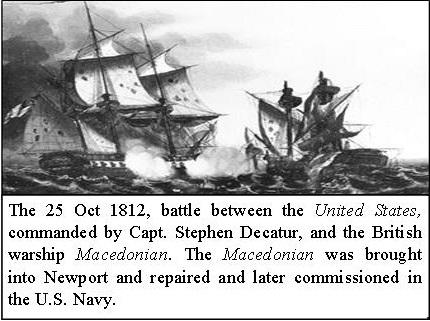10 paces. His midshipman was not proficient with his pistol and could not hope to hit an opponent from so far away. The other duelist and his second were appalled but accepted. Decatur waited until the other duelist’s hand wavered before calling “Fire.” The man missed completely, while Decatur’s midshipman shot through his opponent’s hat. The irate challenger refused to concede that honor had been absolved and demanded a second round. “Aim lower if you wish to live,” Decatur advised his nervous midshipman. This time the midshipman killed his opponent without being injured.
Decatur fought a series of skirmishes with the French during the so-called ‘Quasi-War’. He then participated in the first Barbary War against the pirates in the Mediterranean. During a daring and successful raid on the harbor of Tripoli, he burned the former sailing frigate Philadelphia, which the Tripolitans had captured and made their own, effectively doubling their naval strength. He had disguised himself and his men as North Africans needing a safe harbor. Decatur’s raiders destroyed the huge ship without losing a single man, and his commodore immediately recommended his promotion to captain. To this day, Decatur is the youngest man to earn the rank of captain, at age 24.
All was not well within the Navy, however. The British continued to impress American sailors, kidnapping them from their ships and forcing them to serve the crown. The most egregious offense came in 1807, when the British frigate Leopard confronted Chesapeake, an American frigate, and took three men.
The American Commodore James Barron did not mount much of a defense. Adding to the insult of the impressments, the British refused to accept his surrender of the ship. That meant Barron had been completely dishonored, as he couldn’t even claim the loss occurred during a legitimate battle. Decatur served on his court-martial, and Barron was discharged from the Navy for five years. Barron never forgot the insult.
In 1809 Commodore Decatur took command of the United States. Midshipmen had changed little since his day, and neither had the young officers’ habit of dying in duels instead of combat. Decatur took steps to eliminate needless bloodshed. As captain, he required that all midshipmen consult with him before declaring or accepting a challenge for a duel. His goal was not to abolish dueling, since it played a role in maintaining the bravery and honor of the Navy, but rather to eliminate frivolous contests by giving the men a chance to calm down.
The duel in which Decatur served as a second while a teenage midshipman, for example, was started when a group of midshipmen heard Decatur and his friend
teasing each other and decided Decatur had been insulted. Decatur’s friend was offended and challenged the whole group to a series of duels. The Decatur plan did not eliminate these hotheaded duels but did decrease them. It was ultimately adopted by most other Navy captains.
Decatur’s next chance for glory came during the War of 1812, fighting against Britain for “Free Trade and Sailors’ Rights.” While captaining United States, Decatur took the larger frigate Macedonian, to the shock of the British, who thought they were invincible at sea. He brought his prize home.

In the meantime, the British had blockaded the U.S. Navy, and Decatur’s attempts to sail United States from Connecticut into open water were fruitless. The secretary of the Navy found it unacceptable that his best commodore had been blockaded for a full year.
Decatur was transferred to the heavy frigate President in New York and made the journey over land to his new command. His attempt to run through the blockade stalled first when his ship lodged on a sandbar. Finally, the tide rose, and he sailed his damaged frigate into open water. But his escape attempt failed when he encountered four British ships. He ran. When the British warship Endymion caught up to him, he crippled the lone vessel, and his own ship was damaged in the fight. But soon the three other British ships were on the horizon, and with no chance of victory, Decatur surrendered. He was absolved by a court of his peers, though he never forgave himself for the capture of his ship.
Still, the Navy trusted him with command of the ship of the line Independence and instructions to finalize a peace agreement with the Barbary States. Decatur set sail for the Mediterranean, arriving before the